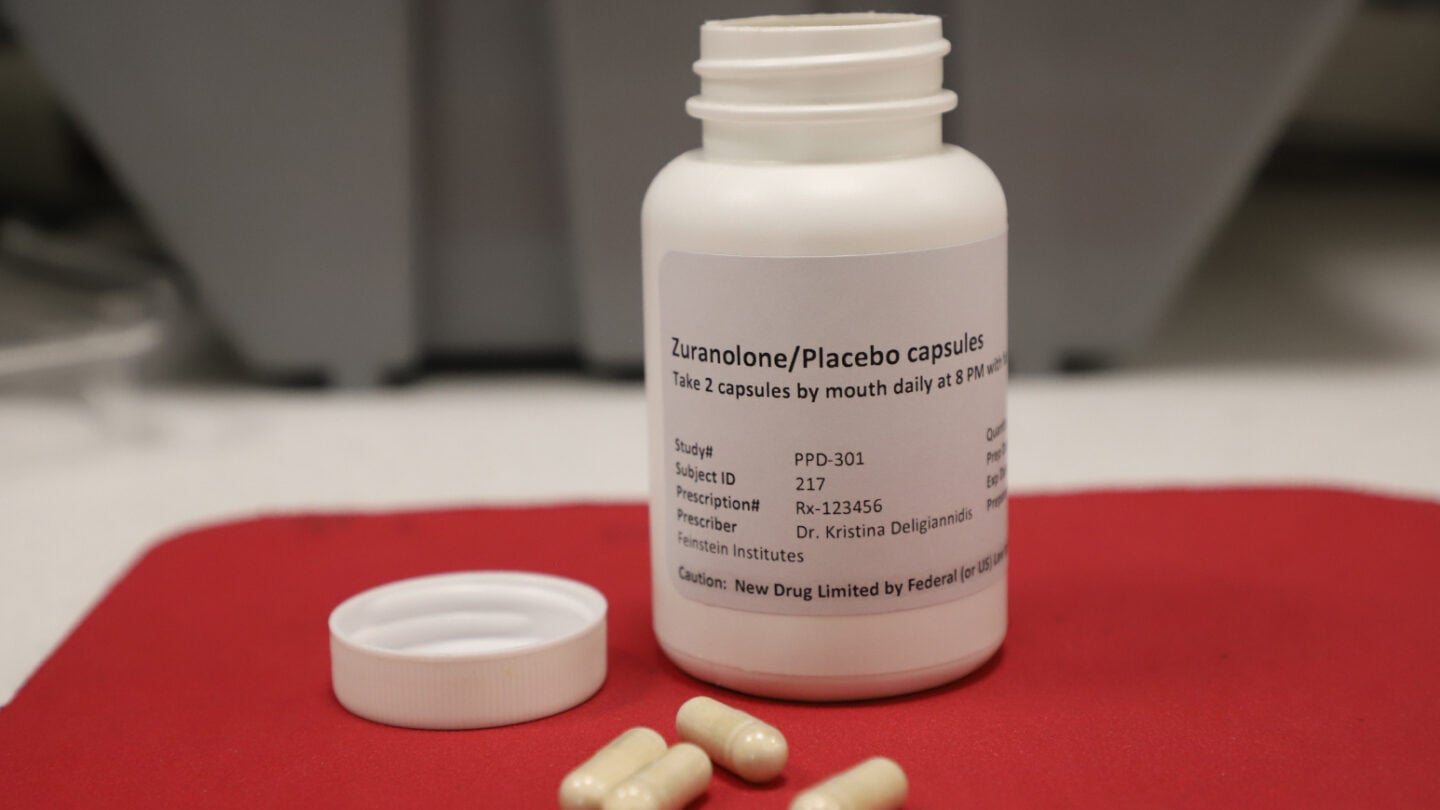What we know — and don't know — about the FDA-approved postpartum depression pill

The Food and Drug Administration has approved the first-ever pill for treating postpartum depression, a potentially life-threatening condition that affects hundreds of thousands of new parents across the U.S. each year.
Manufacturers Sage Therapeutics and Biogen Inc. say the drug, Zurzuvae (zuranolone), will be commercially available in the fourth quarter of this year, which could be as soon as October.
The pill — to be taken once a day for 14 days — has shown promising results in two company studies, with some patients seeing benefits after just three days.
That’s considerably faster than other antidepressants and much less invasive than the only other FDA-approved postpartum depression treatment on the market, which is also from Sage. It’s delivered through IV during a 60-hour, $34,000 process.
The manufacturers have not said how much Zurzuvae will cost — so it’s not clear how much insurance might cover, or how accessible the drug will be to the people who need it most. While anyone can develop postpartum depression, those from lower socioeconomic groups face a heightened risk.
Medical experts and maternal health groups say the drug could be a potentially game-changing option — especially if it’s more affordable than the IV alternative, as many are hoping.
The nonprofit Postpartum Support International called it “welcome news for the estimated 500,000 women in the United States who report experiencing symptoms of this devastating and often misunderstood illness each year.”
The Policy Center for Maternal Mental Health, a national think tank, lauded the drug as a “new ray of hope for individuals experiencing postpartum depression and for prescribing providers.”
“Throughout the U.S., there have been significant shortages of mental health care providers, including providers qualified to treat maternal mental health conditions,” the center’s executive director, Joy Burkhard, said in a statement. “It is absolutely game-changing that the mother’s OB-GYN or midwife can now prescribe this new treatment without consulting or referring to a psychiatrist, and a mother is almost guaranteed to be well in two weeks.”
Even so, experts say, Zurzuvae may not be the best option for everyone, and encourage women to consult with their health care provider about the best course of treatment.
Here’s what to know if you or a loved one is curious about it — and given the prevalence of postpartum depression, that may be more people than you think.
Postpartum depression is a growing problem
Postpartum depression, also called PPD, affects up to 1 in 7 moms and 1 in 10 dads. It’s the most common complication for women who have just had a baby, according to health nonprofit March of Dimes.
And it appears to be on the rise: A recent analysis from the Centers for Disease Control and Prevention found that the rate that depression was diagnosed at delivery was seven times higher in 2015 than in 2000.
PPD often starts within one to three weeks of having a baby, and brings about strong feelings of anxiety, sadness and tiredness that can make it hard for new parents to take care of themselves and their baby.
Experts stress that it’s more than post-pregnancy “baby blues” and needs treatment — in the form of therapy, antidepressants or other meds — to get better.
“Postpartum depression is a serious and potentially life-threatening condition in which women experience sadness, guilt, worthlessness — even, in severe cases, thoughts of harming themselves or their child,” says Dr. Tiffany Farchione, director of the Division of Psychiatry in the FDA’s Center for Drug Evaluation and Research. “And, because postpartum depression can disrupt the maternal-infant bond, it can also have consequences for the child’s physical and emotional development.”
Death by suicide accounts for about 20% of postpartum deaths, according to the CDC. They are a leading cause of maternal mortality in the U.S., where pregnancy-related deaths constitute a deepening crisis.
You can reach the Postpartum Support International helpline by calling or texting 800-944-4773. If you or someone you know is in crisis, please call, text or chat with the Suicide and Crisis Lifeline at 988, or contact the Crisis Text Line by texting TALK to 741741.
Possible causes of PPD include genetics and changing hormone levels after pregnancy. Risk factors include previous physical or sexual abuse, diabetes, complications during pregnancy and other life stressors (like dealing with grief or illness, being unemployed or having low income).
A family history of depression or previous mental health conditions can also increase a person’s risk, though March of Dimes notes that for half of women diagnosed with PPD, it’s their first time being diagnosed with depression.
Medical experts stress that PPD doesn’t make someone a bad parent or person — and that they should contact their health care provider for help if their symptoms don’t fade after two weeks (and immediately if experiencing suicidal thoughts).
This is the second FDA-approved treatment specifically for PPD
Sage Therapeutics is behind both of the PPD drugs to hit the market in recent years.
In 2019, the FDA approved the first of them: brexanalone, marketed as Zulresso.
That drug must be administered intravenously over the course of 60 hours — or 2 1/2 days — in a certified health care facility, with patients monitored consistently because of potentially serious side effects.
Early clinical studies showed that patients experienced a greater reduction of depressive symptoms (compared with a placebo) after 60 hours, and “generally still felt better” 30 days later.
There are plenty of other antidepressants that can be used to treat postpartum depression. But they work completely differently, and take effect more slowly.
For example, SSRIs — like Prozac or Zoloft — may take one to two months to become effective, Rutgers University nursing professor Jamille Nagtalon-Ramos told Morning Edition.
Dr. Kristina Deligiannidis, principal investigator on the Zurzuvae clinical trials, explains that this new drug is different — and faster — because it doesn’t have to do with increasing serotonin levels.
“Zuranolone is a neuroactive steroid, and we believe that it’s helping with stress management deep in the brain,” she told All Things Considered. “We know that this is dysfunctional during pregnancy and postpartum for women who develop depression then. We think that that might be how it’s working.”
The clinical results are promising, though arguably limited
The two studies off which the FDA based its approval show Zurzuvae to be effective at reducing symptoms of depression, with relatively minimal side effects — though some experts say they’d like to see more long-term data.
Participants in the trial were women with PPD whose symptoms began either in their third trimester or within four weeks of delivery. They either took a zuranolone product (including Zurzuvae itself) or a placebo, and compared the results.
“[Participants] reported rapid antidepressant effects across the 14 days and as early as after two doses, so at day three. And then they continued to improve,” Deligiannidis says. “And then we followed them all the way out to day 45. And what we saw is that improvement was sustained for many women.”
The FDA says the treatment effect was still maintained at Day 42.
Though Nagtalon-Ramos, of Rutgers, who says she’s concerned that the trial was completed in only 45 days. She points out that some definitions of postpartum cover the entire first year after having a baby (others break the postpartum phase down into three stages, the third lasting up to six months).
“And so I’m thinking about, after 45 days, what does that look like?” she asks. “Is there relapse or is there continued benefits after 45 days?”
NPR has reached out to the FDA for comment.
The most common side effects of Zurzuvae include drowsiness, dizziness, diarrhea, fatigue, nasopharyngitis (the common cold) and urinary tract infection.
The FDA also says it may cause suicidal thoughts and behavior, but Deligiannidis says such labeling is required for all antidepressants and the researchers didn’t see any such reports in their trials.
The label warns patients not to drive or operate heavy machinery for at least 12 hours after taking the pill — which it recommends doing in the evening with a fatty meal.
Deligiannidis says side effects observed in the study were “mild to moderate,” and notes that it is a relatively short course of medication.
“So my hope is that any discomforts patients may have with the medication will be time-limited,” she adds.
It’s not clear how much the drug will cost
Another issue of concern is the cost — and accessibility — of the pill. Drugmakers have delayed that decision until later this year, Axios reports.
Sage Therapeutics told investors on Monday that the company is committed to ensuring the drug remains accessible, with one of its goals being “that every woman with PPD who is prescribed Zurzuvae can access it, regardless of financial circumstance.”
But details of how that will happen aren’t yet clear.
“We’re eagerly awaiting, though we will have to wait some time to find out the cost of the treatment course and then also how insurers will cover this new medication,” Deligiannidis explains.
Another complicating factor, Nagtalon-Ramos points out, is the changing health insurance coverage for the postpartum period itself.
For example, federal law requires states to provide pregnancy-related Medicaid coverage (which finances about 4 in 10 U.S. births) through 60 days after a birth, but some people may lose it after that point.
The 2021 American Rescue Plan Act gives states the option to extend postpartum coverage to 12 months, which 36 states and D.C. have so far (and 10 others plan to do).
“That is definitely something that we are concerned about,” Nagtalon-Ramos says. “So having something that is available to all patients financially would be great.”
It may not be right — or enough — for everyone
Even if the pill does become broadly accessible, medical experts warn that it may not be the best choice for all new moms.
Some may prefer talk therapy over a drug, while others who have been treated for depression in the past may choose to return to that same medication rather than try a new one, for example.
Plus, little is currently known about the effect of Zurzuvae in women who are breastfeeding, writes psychiatrist Dr. Ruta Nonacs with the Massachusetts General Hospital Center for Women’s Mental Health.
She explains that participants in the clinical trials were asked to forgo breastfeeding while taking the drug, so there is no information available about the secretion of the drug into breast milk, any impact of the drug on breast milk production or the potential effects of zuranolone on nursing infants.
“For many women, having to interrupt or avoid breastfeeding while receiving treatment for PPD may be a significant deterrent,” Nonacs writes.
Other experts note that Zurzuvae might be part of a broader treatment plan that includes other resources, like certain types of therapy and lifestyle strategies — potentially to be continued after the dosage runs out.
“Postpartum time is a very difficult, challenging time for new parents,” Deligiannidis acknowledges. “And if they do need additional treatments after day 14, then we have other things.”
9(MDAxODM0MDY4MDEyMTY4NDA3MzI3YjkzMw004))








